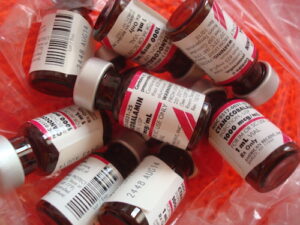Anemia
Nutritional anemias resulting from a vitamin B12, folate or iron deficiency are common in people who have had a gastrectomy. Anemia may not occur until close to a year or more after surgery but it is important for your healthcare provider to monitor levels of these nutrients.
B12 Deficiency

Two components necessary for vitamin B12 absorption, gastric acid, and intrinsic factor, are less available or not available with the removal of all or part of the stomach. Therefore, people who have had a partial or complete gastrectomy need to supplement their diet with oral vitamin B12 or intramuscular or subcutaneous injections of vitamin B12.
Normal B12 levels vary with the laboratory used but are usually in the range of 200 – 900 pg/mL. Levels below 200 pg/mL may indicate a deficiency. Symptoms of Vitamin B12 deficiency may include numbness, weakness, abnormal gait, memory loss, depression, and anemia among others. It is important to have your B12 levels monitored by your healthcare provider at baseline following surgery and then every 3 months until they are normalized. Ongoing monitoring of B12 levels should occur on a yearly basis.
Traditionally B12 has been treated with intramuscular injections. For B12 deficiency states, this supplementation may begin with 1,000 mcg every day for 1 week followed by 1,000 mcg every week for 4 weeks. Or, alternatively, weekly injections of 1000 mcg of vitamin B-12 for 5-6 weeks, followed by monthly injections.
To maintain normal B12 levels, monthly 1,000 mcg injections are usually required for life. It is important to discuss with your health care provider as there may be individual cases were more or less supplementation is appropriate.
There are a variety of ways to administer vitamin B12. The traditional approach is intramuscular injections. More recently, subcutaneous injections have been used. Both of these types of administration routes are effective. I think it’s important to discuss with your physician which way would be best for you. In addition to the intramuscular and subcutaneous administration, research has shown that oral B12 supplementation (B12 tablets) with 1,000-2,000 mcg per day is as beneficial as intramuscular supplementation (B12 shots) – especially once you are at baseline. Evidence shows that your small intestine can produce some intrinsic factors following a gastrectomy. Sublingual and intranasal are other possible ways to supplement with B12 once B12 levels have stabilized. It is important to discuss alternative methods of administration of B12 with your healthcare provider to determine which supplementation route works best for you. Depending on your lifestyle, you may find it easier to have a monthly injection, while others would be more compliant with a daily tablet. If you change the administration route of B12, i.e. from injection to oral, more frequent monitoring may be needed until baseline levels are achieved.
Folate Deficiency
Although not common, a folate deficiency may develop after a gastrectomy due to malabsorption and impaired digestion. If a folate deficiency is suspected, your health care provider should obtain a red blood cell (RBC) folate level (rather than serum folate) to determine if there is an actual folate deficiency. Vitamin B12 is needed to activate folate, and supplementing with folate may mask a vitamin B12 deficiency, so vitamin B12 levels should be considered before supplementing with folate. For this reason, it is important to talk about your folate deficiency concerns with your healthcare provider.
Iron Deficiency
Iron deficiency anemia is a common effect of a partial or total gastrectomy. Most iron absorption occurs in the duodenum or upper part of the small intestine. Most partial and complete gastrectomy procedures will bypass the duodenum, making iron absorption more difficult. In addition, the rapid transit of food through the intestine allows for decreased time for the absorption of iron. Finally, less acid is available in the small intestine after partial or total gastrectomy. Gastric acid converts iron to a form more readily absorbed by the body. These factors, along with a decreased intake of foods that are good sources of iron, contribute to post-gastrectomy iron deficiency.
Your health care provider will test your serum ferritin level to determine iron deficiency. If you are deficient, you may need oral iron supplementation. Adults are usually require a supplementation of 60 – 200 mg elemental iron daily. Oral iron is available as ferrous sulphate (65 mg elemental iron), ferrous gluconate (26 mg elemental iron), or ferrous fumarate (106 mg elemental iron). Iron supplements are usually given three times per day to maximize absorption. Taking iron supplements with foods rich in Vitamin C will also enhance absorption. Sustained release tablets may result in decreased absorption for patients who have had a total gastrectomy.
Some people have difficulty taking iron supplements due to side effects such as nausea and constipation. If this is the case, it may help to start slowly at a reduced dose and work up to the recommended amount. Some supplementation is usually better than no supplementation. It may also help to include iron rich foods in your diet. Meat, fish and poultry contain heme iron which us more available to your body than non-heme iron.
Learn more about Intravenous Iron injections here
Good dietary sources of iron include beef, veal, clams, oysters, shrimp, sardines, bran flakes and other fortified cereals, cream of wheat, oatmeal (fortified), baked potatoes with skin, dry beans (navy, lima, lentils, kidney), soybeans, tofu, spinach, dried prunes, and dried apricots.
Eating foods rich in vitamin C along with foods high in iron will enhance iron absorption. Foods rich in vitamin C include oranges, grapefruit, cantaloupe, pineapple, strawberries, raspberries, tomatoes, broccoli, cauliflower, spinach, kale, asparagus, potatoes, and sweet potatoes.